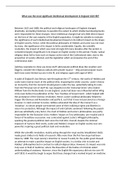What was the most significant intellectual development in England 1625-88?
Between 1625 and 1688, the political and religious landscapes of England changed
drastically, prompting historians to question the extent to which intellectual developments
were responsible for these changes. Since intellectual changes had very little direct impact
on the lives of the vast majority of the English population, it might be suitable to evaluate
the significance of each intellectual development based on its indirect impact on the shape
of English society. Hence, while the political philosophy of Hobbes and Locke was not read
by many, the significance of its impact is fairly considerable. Equally, the scientific
revolution, the impact of which was most strongly felt many decades after the period, is
considered largely insignificant in its impact on English society in this period. Finally, radical
religious ideas fail to have such an impact as the end of the Confessional state, due to the
proportion of society affected, and the legislation which accompanies the end of the
confessional state.
[add key examples to show you know stuff; add popular political ideas like Levellers and
Diggers; consider the religious radicals with greater nuance – relig and pol popular issues
both have some limited success in the IR, and religious again with appt of WIII]
In spite of England’s low literacy rate throughout the 17th century, the works of Hobbes and
Locke were read by much of the political elite, impacting the wider country. Locke’s theory
on monarchy, that the monarch should govern under the law, potentially taking its roots
from the Personal rule of 1629-40, was impactful on the ‘Immortal Seven’ who invited
William from the Netherlands to rule England. Locke had been very influential within Whig
circle even before his publication of the ‘Two Treatises of Government’, which helped with
the acceptance of the Glorious revolution. Hence, Locke’s political philosophy helped to
trigger the Glorious and Revolution and justify it, such that it was not perceived as a foreign
invasion. In stark contrast to Locke, Hobbes advocated the idea of the monarch as a
‘leviathan’, to whom people surrendered some of their individual rights and liberties in
return for protection. Although the impact of anti-Catholic sentiment following the popish
plot was admittedly a key factor, the clash of Hobbes and Locke’s philosophies was partly
responsible for the Exclusion Crisis. Hobbes’ impact on Tory philosophy, pro-royalist and in
favour of hereditary succession, was contrasted against Locke’s Whiggish philosophy,
sparking the greatest political clash since the Civil War. Overall, despite the minimal
exposure of many to their works, Locke and Hobbes’s impact on English society was very
powerful, inspiring a great political clash and revolution.
While the scientific revolution, mainly acting through the royal society (established 1662),
made great strides in its fields of research, little more than the first few steps had been
taken by 1688. The royal society’s intention to research solely for the public good showed
an attempt to make a positive impact on English society, in a similar vein to Locke and
Hobbes’ philosophies but in contrast to radical religious ideas. However, its impact was only
truly seen in field of medicine, where the dissection of the bodies of criminals aided
understanding of anatomy. However, since the English life expectancy did not rise over 40
until 1810, it would be tough to argue that these changes had a marked impact on medicine




